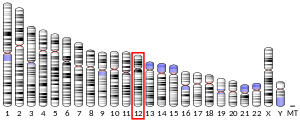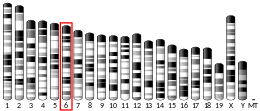TAS2R46
Taste receptor type 2 member 46 is a protein that in humans is encoded by the TAS2R46 gene.[5][6]
References
- ENSG00000262525, ENSG00000226761 GRCh38: Ensembl release 89: ENSG00000278111, ENSG00000262525, ENSG00000226761 - Ensembl, May 2017
- GRCm38: Ensembl release 89: ENSMUSG00000059382 - Ensembl, May 2017
- "Human PubMed Reference:". National Center for Biotechnology Information, U.S. National Library of Medicine.
- "Mouse PubMed Reference:". National Center for Biotechnology Information, U.S. National Library of Medicine.
- Bufe B, Hofmann T, Krautwurst D, Raguse JD, Meyerhof W (Oct 2002). "The human TAS2R16 receptor mediates bitter taste in response to beta-glucopyranosides". Nat Genet. 32 (3): 397–401. doi:10.1038/ng1014. PMID 12379855.
- "Entrez Gene: TAS2R46 taste receptor, type 2, member 46".
Further reading
- Margolskee RF (2002). "Molecular mechanisms of bitter and sweet taste transduction". J. Biol. Chem. 277 (1): 1–4. doi:10.1074/jbc.R100054200. PMID 11696554.
- Montmayeur JP, Matsunami H (2002). "Receptors for bitter and sweet taste". Curr. Opin. Neurobiol. 12 (4): 366–71. doi:10.1016/S0959-4388(02)00345-8. PMID 12139982.
- Zhang Y, Hoon MA, Chandrashekar J, Mueller KL, Cook B, Wu D, Zuker CS, Ryba NJ (2003). "Coding of sweet, bitter, and umami tastes: different receptor cells sharing similar signaling pathways". Cell. 112 (3): 293–301. doi:10.1016/S0092-8674(03)00071-0. PMID 12581520.
- Conte C, Ebeling M, Marcuz A, Nef P, Andres-Barquin PJ (2003). "Identification and characterization of human taste receptor genes belonging to the TAS2R family". Cytogenet. Genome Res. 98 (1): 45–53. doi:10.1159/000068546. PMID 12584440.
- Fischer A, Gilad Y, Man O, Pääbo S (2005). "Evolution of bitter taste receptors in humans and apes". Mol. Biol. Evol. 22 (3): 432–6. doi:10.1093/molbev/msi027. PMID 15496549.
- Go Y, Satta Y, Takenaka O, Takahata N (2006). "Lineage-specific loss of function of bitter taste receptor genes in humans and nonhuman primates". Genetics. 170 (1): 313–26. doi:10.1534/genetics.104.037523. PMC 1449719. PMID 15744053.
This article incorporates text from the United States National Library of Medicine, which is in the public domain.
This article is issued from Wikipedia. The text is licensed under Creative Commons - Attribution - Sharealike. Additional terms may apply for the media files.



